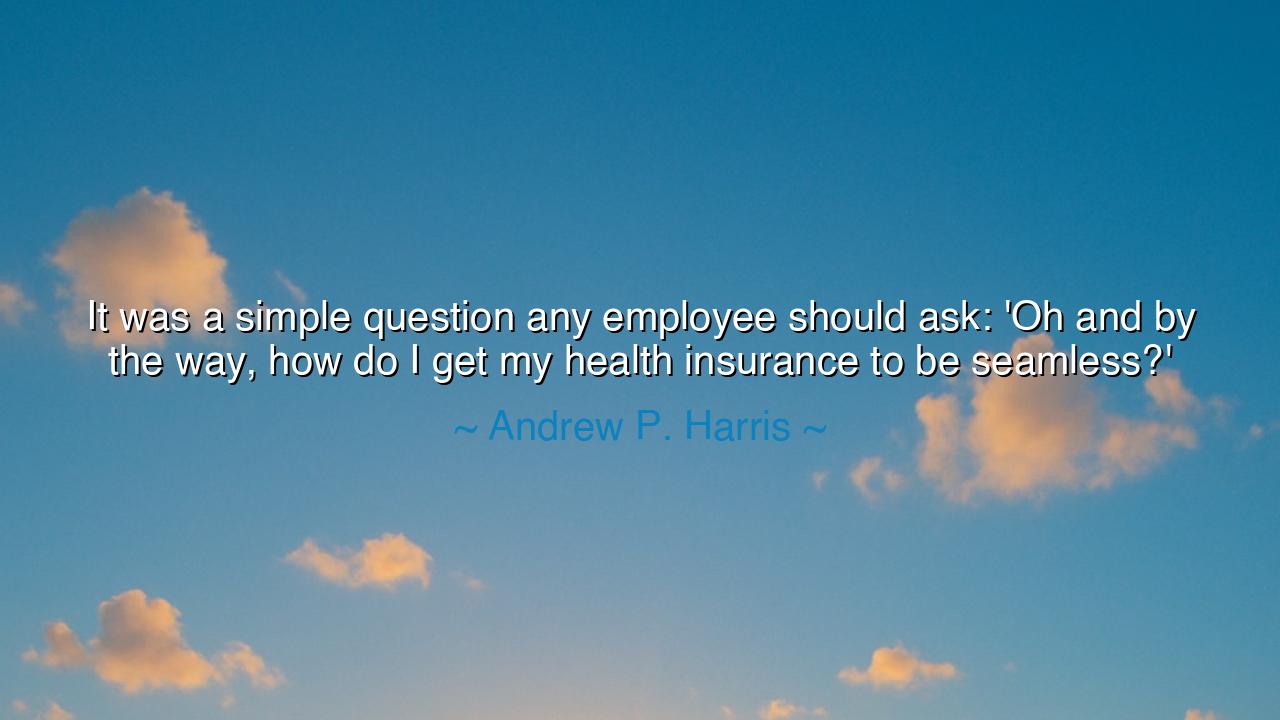
It was a simple question any employee should ask: 'Oh and by the
It was a simple question any employee should ask: 'Oh and by the way, how do I get my health insurance to be seamless?'






“It was a simple question any employee should ask: ‘Oh and by the way, how do I get my health insurance to be seamless?’” Thus spoke Andrew P. Harris, not as a mere lawmaker or observer of bureaucracy, but as a witness to one of the quiet struggles of modern life — the quest for stability, dignity, and care in a system that too often forgets the humanity it serves. His words, though simple, reveal a profound truth: that even the most basic questions — those concerning health, livelihood, and security — should not require courage to ask. And yet, in an age where systems grow vast and impersonal, such questions have become acts of quiet bravery.
The ancients would have found such a dilemma strange and sorrowful. For in their eyes, the well-being of the citizen was sacred, a duty of both the ruler and the community. The physician Hippocrates spoke not only of healing bodies but of preserving wholeness, understanding that the health of one sustains the health of all. But in our time, as Andrew Harris observes, this simple harmony is too easily lost. The worker, who labors faithfully to build and sustain the world, must still ask — hesitantly, humbly — how to receive the care that should already be his right.
Behind this “simple question” lies a deeper wound: a civilization that has grown so complex that compassion risks being buried beneath policy. The employee, the ordinary man or woman who gives their days and strength to a greater purpose, becomes caught in the machinery of procedure. They must navigate forms, networks, and faceless voices — when all they seek is seamless care, the gentle assurance that if illness comes, they will not stand alone. Andrew P. Harris’s words carry the weariness of that truth and the wisdom of those who recognize that systems, however advanced, must still serve the human heart.
Consider the story of Dr. Elizabeth Blackwell, the first woman in the Western world to earn a medical degree. In her time, she faced barriers that seemed insurmountable — institutions that denied her, peers who scorned her. Yet she persisted, not for pride, but for compassion. Her victory was not only in earning the title of doctor but in opening the door for others to receive care more freely, more humanely. Like the employee in Harris’s quote, she asked a question that seemed simple but revealed the flaws of her age: “Why should care be denied to those who seek it?” Her courage reminds us that progress begins when the ordinary voice dares to demand what is just.
Health insurance, in this modern era, has become the symbol of that greater struggle — the link between a person’s labor and their right to healing. To make it seamless is not merely a matter of policy, but of philosophy: it is to say that no one should fall through the cracks of the system that claims to protect them. When a society forgets this, it forgets its soul. For what good are wealth and progress if a single mother fears a doctor’s visit, or an aging worker hesitates to seek care lest the bills consume his savings? True civilization is measured not by its monuments or machines, but by how it protects its most vulnerable.
Thus, Harris’s question, though posed in simplicity, echoes with timeless depth. It reminds us that justice often begins in the smallest of inquiries — a citizen asking for fairness, an employee seeking clarity, a patient asking to be seen. Each question carries the potential to awaken conscience, to remind the powerful that the structures they oversee are not made of stone and law alone, but of living hearts.
Let this be the lesson to those who hear: never be afraid to ask the simple question, for it often reveals what is most wrong — and what is most right — in the world. Demand transparency. Expect dignity. Insist that compassion be woven into the systems that govern your life. And for those who hold power, remember that greatness lies not in creating complexity, but in ensuring that every soul may walk through it without fear or confusion.
So remember Andrew P. Harris’s words, not as an echo of bureaucracy, but as a call to conscience: “How do I make my health insurance seamless?” In that plea lies the greater cry of humanity — “How do we make care, justice, and compassion flow without interruption?” The answer lies not only in policy, but in the courage to never stop asking, and the wisdom to never stop listening.






AAdministratorAdministrator
Welcome, honored guests. Please leave a comment, we will respond soon